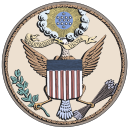
Back Kentucky en la guerra de Secesión Spanish Kentucky durant la guerre de Sécession French Kentucky belépése az amerikai polgárháborúba Hungarian Kentucky nella guerra di secessione americana Italian Кентукки в Гражданской войне Russian
| History of Kentucky |
|---|
|
|
|
 |
|
Union states in the American Civil War |
|---|
|
|
| Dual governments |
| Territories and D.C. |
Kentucky was a southern border state of key importance in the American Civil War. It officially declared its neutrality at the beginning of the war, but after a failed attempt by Confederate General Leonidas Polk to take the state of Kentucky for the Confederacy, the legislature petitioned the Union Army for assistance. Though the Confederacy controlled more than half of Kentucky early in the war, after early 1862 Kentucky came largely under U.S. control. In the historiography of the Civil War, Kentucky is treated primarily as a southern border state, with special attention to the social divisions during the secession crisis, invasions and raids, internal violence, sporadic guerrilla warfare, federal-state relations, the ending of slavery, and the return of Confederate veterans.[1]
Kentucky was the site of several fierce battles, including Mill Springs and Perryville. It was the arena to such military leaders as Ulysses S. Grant on the Union side, who first encountered serious Confederate gunfire coming from Columbus, Kentucky, and Confederate cavalry leader Nathan Bedford Forrest. Forrest proved to be a scourge to the Union Army in western Kentucky, even making an attack on Paducah. Kentuckian John Hunt Morgan further challenged Union control, as he conducted numerous cavalry raids through the state.
Kentucky was the birthplace of Abraham Lincoln, his wife Mary Todd, and his southern counterpart, Confederate President Jefferson Davis. Lincoln had declared, early in the war, "I think to lose Kentucky is nearly the same as to lose the whole game."[2]
An estimated 25–40,000 Kentuckians served as Confederate soldiers, while 74–125,000 Kentuckians served as Union soldiers, including 24–25,000 Black Kentuckians, free and enslaved.[3][4][5][6]
- ^ Smith, John David (Spring 2014). "Whither Kentucky Civil War and Reconstruction Scholarship?". The Register of the Kentucky Historical Society. 112 (2): 223–247.
- ^ Nicolay, John; Hay, John (eds.). Works of Lincoln (V ed.). p. 117.
- ^ Quisenberry, A. C. (September 1920). "Kentucky Union Troops in the Civil War". Register of the Kentucky State Historical Society. 18 (54): 13–18.
- ^ Klotter in Kentucky's Civil War 1861–1865, p. 14.
- ^ "The Civil War – Freedom Park". louisville.edu. Retrieved June 22, 2020.
- ^ Eblen, Tom (June 13, 2017). "Cemetery research reveals another 51 black Civil War veterans – and great stories". Lexington Herald Leader. Retrieved June 21, 2020.
© MMXXIII Rich X Search. We shall prevail. All rights reserved. Rich X Search